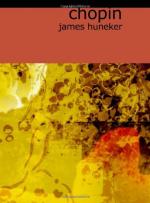Chopin is the musical soul of Poland; he incarnates its political passion. First a Slav, by adoption a Parisian, he is the open door because he admitted into the West, Eastern musical ideas, Eastern tonalities, rhythms, in fine the Slavic, all that is objectionable, decadent and dangerous. He inducted Europe into the mysteries and seductions of the Orient. His music lies wavering between the East and the West. A neurotic man, his tissues trembling, his sensibilities aflame, the offspring of a nation doomed to pain and partition, it was quite natural for him to go to France—Poland had ever been her historical client—the France that overheated all Europe. Chopin, born after two revolutions, the true child of insurrection, chose Paris for his second home. Revolt sat easily upon his inherited aristocratic instincts—no proletarian is quite so thorough a revolutionist as the born aristocrat, witness Nietzsche—and Chopin, in the bloodless battle of the Romantics, in the silent warring of Slav against Teuton, Gaul and Anglo-Saxon, will ever stand as the protagonist of the artistic drama.
All that followed, the breaking up of the old hard-and-fast boundaries on the musical map is due to Chopin. A pioneer, he has been rewarded as such by a polite ignorement or bland condescension. He smashed the portals of the convention that forbade a man baring his soul to the multitude. The psychology of music is the gainer thereby. Chopin, like Velasquez, could paint single figures perfectly, but to great massed effects he was a stranger. Wagner did not fail to profit by his marvellously drawn soul-portraits. Chopin taught his century the pathos of patriotism, and showed Grieg the value of national ore. He practically re-created the harmonic charts, he gave voice to the individual, himself a product of a nation dissolved by overwrought individualism. As Schumann assures us, his is “the proudest and most poetic spirit of his time.” Chopin, subdued by his familiar demon, was a true specimen of Nietzsche’s Ubermensch,—which is but Emerson’s Oversoul shorn of her wings. Chopin’s transcendental scheme of technics is the image of a supernormal lift in composition. He sometimes robs music of its corporeal vesture and his transcendentalism lies not alone in his striving after strange tonalities and rhythms, but in seeking the emotionally recondite. Self-tormented, ever “a dweller on the threshold” he saw visions that outshone the glories of Hasheesh and his nerve-swept soul ground in its mills exceeding fine music. His vision is of beauty; he persistently groped at the hem of her robe, but never sought to transpose or to tone the commonplace of life. For this he reproved Schubert. Such intensity cannot be purchased but at the cost of breadth, of sanity, and his picture of life is not so high, wide, sublime, or awful as Beethoven’s. Yet is it just as inevitable, sincere and as tragically poignant.




